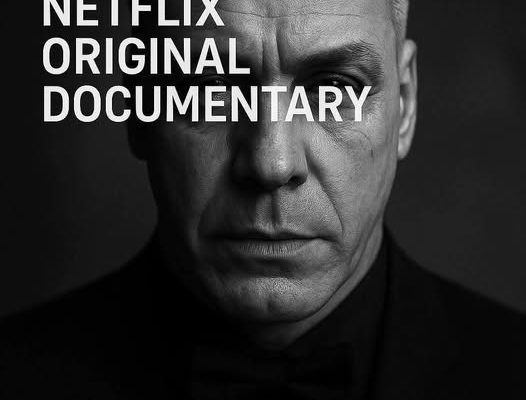When Netflix makes an announcement about a major documentary, the streaming world takes notice, but when that announcement involves Till Lindemann, the enigmatic frontman of the German industrial metal powerhouse Rammstein, the reaction is even more electric. The platform has officially released the trailer for the highly anticipated Till Lindemann documentary, and already the clip has set social media abuzz with excitement, debate, and curiosity. For years, Lindemann has been one of the most polarizing yet intriguing figures in modern music. His persona is a carefully crafted mixture of menace, art, poetry, and provocation. He is not just a vocalist; he is a poet, a showman, and in many ways a performance artist who thrives on shocking audiences into reconsidering their relationship with music, performance, and even culture itself. The new documentary promises to peel back the layers of the man behind the fire-breathing, leather-clad exterior that millions have come to associate with stadium-filling shows and controversial music videos.
The trailer, which Netflix rolled out with precision timing, is already being dissected frame by frame by fans and critics alike. It features haunting slow-motion shots of Lindemann on stage, engulfed in the pyrotechnics that have become synonymous with Rammstein’s performances, juxtaposed with quieter, intimate moments of him writing poetry, walking alone in desolate landscapes, and reflecting on his career in candid interviews. Viewers are immediately confronted with the central question that the documentary seems to pose: who really is Till Lindemann when the stage lights dim and the mask of performance falls away? This framing is particularly compelling because for decades Lindemann has been known more for his theatrical stage persona than his private life. Even in interviews, he has often maintained a cryptic or elusive demeanor, leaving fans to wonder where the performance ends and the man begins.
For Netflix, this project represents another step in its growing portfolio of high-profile music documentaries. The platform has had great success with projects centered on stars like Taylor Swift, Kanye West, and Lady Gaga, but Lindemann represents something different altogether. His fanbase is global, cutting across languages and cultures, and his music carries a level of theatricality and political edge that few mainstream artists dare to touch. The trailer hints at the documentary’s ambition: not just to celebrate Lindemann’s career, but to interrogate it. There are moments that appear to explore the controversies surrounding his lyrics and stagecraft, accusations of going too far with imagery, and the way critics have interpreted his work through political, cultural, and social lenses. At the same time, the film seems poised to highlight his lesser-known endeavors, such as his work as a poet and his fascination with art outside of music.
The anticipation is heightened by the fact that Rammstein itself is one of the most secretive bands in the world, rarely allowing outsiders a glimpse into their creative process. For decades, they have maintained a tight grip on their image, cultivating mystery and shock value with equal measure. The documentary trailer shows snippets of behind-the-scenes footage, including candid moments with bandmates, rehearsals, and even heated arguments that reveal the tensions inherent in creating such an elaborate and intense form of performance art. For fans, these glimpses are priceless, offering an unfiltered look at dynamics that are usually hidden from the public.
The emotional heart of the trailer appears to rest in Lindemann’s reflections on his life and his struggles. Known as a man of contradictions, he is both a performer who thrives on outrage and a poet who seeks beauty in darkness. The documentary promises to explore his childhood in East Germany, where he grew up under the shadow of the Berlin Wall. This historical backdrop is not just a detail of his biography; it is a critical element in understanding the worldview that informs his work. Growing up in a society marked by censorship, surveillance, and limited artistic freedom left an indelible mark on Lindemann, shaping both his rebelliousness and his fascination with challenging authority through art. Netflix’s decision to emphasize this narrative in the trailer signals that the documentary will not shy away from the complexities of his identity and the broader historical forces that shaped him.
As expected, reactions to the trailer have been swift and polarized. Fans of Rammstein and Lindemann have flooded social media with excitement, praising the boldness of Netflix in tackling such a controversial figure. Many have expressed gratitude that a major platform is giving Lindemann the space to tell his story on his own terms. Others, however, have voiced skepticism, questioning whether a platform like Netflix, known for its polished storytelling, will capture the raw, uncompromising spirit of an artist like Lindemann. Some critics have raised concerns that the documentary could sanitize or over-explain his art, stripping it of its mystique. But even these criticisms only fuel the anticipation, ensuring that when the documentary drops, it will be one of the most talked-about cultural events of the year.
The trailer also hints at the global reach of Lindemann’s art. Clips show fans from around the world—Latin America, Asia, North America, and Europe—screaming his lyrics, many of which are in German, a testament to the way his music transcends linguistic barriers. Few artists have managed to build such a fervent international following while performing predominantly in a non-English language, and the documentary appears to delve into how Rammstein and Lindemann cultivated this phenomenon. Scenes of sold-out stadiums are contrasted with quieter interviews, underscoring the duality of being both an icon and a deeply private individual.
One of the most striking aspects of the trailer is its emphasis on Lindemann’s poetry. Many fans outside of Germany may not realize that he has published several volumes of poetry, works that reveal a very different side of his creative psyche. The film seems intent on drawing connections between his written word and his music, suggesting that the provocative lyrics and shocking imagery of his songs are rooted in a deep engagement with literature, philosophy, and art. This focus will likely broaden the audience’s understanding of him, showing that behind the flames and spectacle lies a thoughtful, introspective artist who has always used provocation as a tool to force reflection rather than simply to shock.
Another thread that emerges from the trailer is the theme of mortality and legacy. Lindemann, now in his early sixties, is visibly reflective about his career and the passage of time. In one particularly haunting shot, he is seen gazing at an old photograph of himself as a young man, before the fame and global notoriety. This image, combined with voice-over lines about the sacrifices and costs of a life lived on stage, suggests that the documentary will not simply be a celebration of his career but also a meditation on what it means to dedicate one’s life to art that constantly pushes boundaries. For longtime fans, this promises to be an emotional journey, while for newcomers it offers an intimate look at the human being behind the legend.
Netflix’s decision to release the trailer at this moment is also telling. With the band continuing to tour and Rammstein remaining as popular as ever, the timing ensures that the documentary will land at the peak of global interest. It also comes at a time when conversations about censorship, freedom of expression, and the role of art in society are more relevant than ever. Lindemann’s work has often been at the center of these debates, making the documentary not just an exploration of one man’s career, but a case study in the power of art to provoke, unsettle, and challenge cultural norms.
What makes this project stand out among other Netflix music documentaries is the inherent tension it promises to explore. Lindemann is not a universally beloved pop star but a divisive figure whose art has been accused of everything from glorifying violence to subverting political taboos. At the same time, he is revered for his fearlessness and his refusal to dilute his vision for commercial gain. By choosing him as a subject, Netflix is taking a risk, but it is a calculated one. The buzz surrounding the trailer alone demonstrates that there is a massive audience hungry to learn more about him, whether they approach with admiration, curiosity, or criticism.
The release of the trailer has also reignited discussions about Rammstein’s place in music history. The band’s fusion of industrial metal, theatricality, and controversial themes has left an indelible mark on global music culture. While many bands have imitated their style, none have managed to replicate their combination of shock, artistry, and authenticity. The documentary, by focusing on Lindemann, naturally invites reflection on the band as a whole, and fans will likely walk away with a deeper appreciation of how much of Rammstein’s identity is tied to Lindemann’s vision and presence.
As the premiere date draws closer, the hype surrounding this project shows no signs of slowing down. The trailer has done exactly what it was meant to do: spark conversation, generate anticipation, and give just enough away without revealing the full scope of what the documentary has to offer. For fans of Lindemann, it represents a long-awaited opportunity to see their idol in a new light. For those who have never fully understood the fascination with him, it may provide answers—or at least new questions. And for Netflix, it is another example of how the platform continues to position itself as the home of ambitious, culture-shaping storytelling.
The anticipation now shifts to the documentary’s release, when audiences around the world will finally have the chance to experience the full narrative that the trailer only hints at. Will it humanize Lindemann, or will it deepen the aura of mystery that surrounds him? Will it clarify the controversies, or will it lean into them? Regardless of the answers, one thing is certain: the release of this documentary marks a major cultural moment, a chance to revisit the career of one of music’s most fascinating figures and to reconsider the role of art in provoking thought and emotion in an increasingly complex world. Till Lindemann has always been larger than life on stage, but this documentary promises to show us that behind the fire and fury lies a man whose story is just as compelling as his music.



